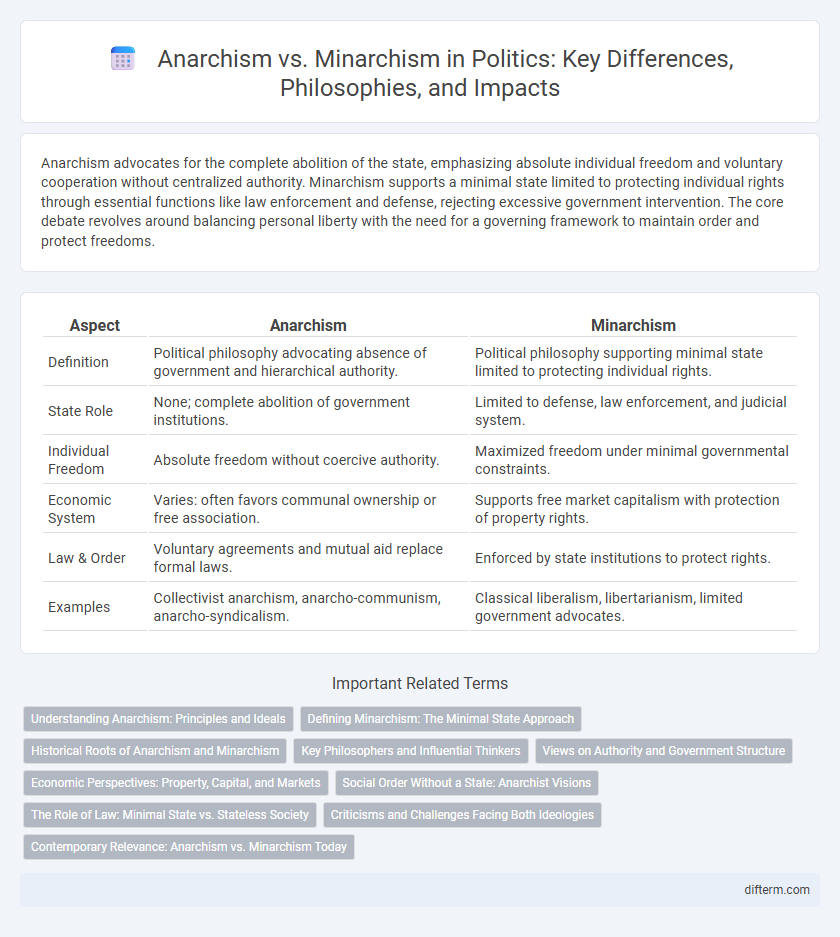Anarchism advocates for the complete abolition of the state, emphasizing absolute individual freedom and voluntary cooperation without centralized authority. Minarchism supports a minimal state limited to protecting individual rights through essential functions like law enforcement and defense, rejecting excessive government intervention. The core debate revolves around balancing personal liberty with the need for a governing framework to maintain order and protect freedoms.
Table of Comparison
| Aspect | Anarchism | Minarchism |
|---|---|---|
| Definition | Political philosophy advocating absence of government and hierarchical authority. | Political philosophy supporting minimal state limited to protecting individual rights. |
| State Role | None; complete abolition of government institutions. | Limited to defense, law enforcement, and judicial system. |
| Individual Freedom | Absolute freedom without coercive authority. | Maximized freedom under minimal governmental constraints. |
| Economic System | Varies: often favors communal ownership or free association. | Supports free market capitalism with protection of property rights. |
| Law & Order | Voluntary agreements and mutual aid replace formal laws. | Enforced by state institutions to protect rights. |
| Examples | Collectivist anarchism, anarcho-communism, anarcho-syndicalism. | Classical liberalism, libertarianism, limited government advocates. |
Understanding Anarchism: Principles and Ideals
Anarchism advocates for a stateless society where individuals freely cooperate without hierarchical authority, emphasizing self-governance, voluntary association, and the dismantling of coercive institutions. It challenges the legitimacy of centralized power, promoting direct action and mutual aid as means to achieve social order and justice. Anarchism's core principles include autonomy, decentralization, and anti-authoritarianism, contrasting sharply with minarchism's limited government framework.
Defining Minarchism: The Minimal State Approach
Minarchism advocates for a minimal state limited to protecting individual rights through essential functions such as law enforcement, national defense, and judiciary systems. It emphasizes a government constrained by a constitution to prevent tyranny while maintaining social order and property rights. Unlike anarchism, which calls for the abolition of the state, minarchism supports a limited governmental framework to safeguard liberty and security.
Historical Roots of Anarchism and Minarchism
Anarchism traces its historical roots to 19th-century thinkers like Pierre-Joseph Proudhon and Mikhail Bakunin, who challenged centralized authority and promoted stateless societies based on voluntary cooperation. Minarchism emerged from classical liberal traditions, notably influenced by John Locke and later Robert Nozick, advocating for a minimal state limited to protecting individual rights and property. Both ideologies respond to the role of government but diverge sharply on the extent and legitimacy of state power.
Key Philosophers and Influential Thinkers
Key philosophers of anarchism include Mikhail Bakunin, Peter Kropotkin, and Emma Goldman, who advocate for the abolition of the state and hierarchical authority. Minarchism is heavily influenced by thinkers like Robert Nozick and Ayn Rand, who argue for limited government primarily focused on protecting individual rights and enforcing contracts. These differing philosophical foundations highlight contrasting perspectives on the role and necessity of the state in political organization.
Views on Authority and Government Structure
Anarchism advocates for the complete abolition of centralized authority, emphasizing voluntary cooperation and self-governed communities without hierarchical government structures. Minarchism supports a minimal state limited to protecting individual rights, enforcing contracts, and maintaining law and order, rejecting expansive government intervention. These divergent views reflect contrasting beliefs about the legitimacy and scope of authority in society, with anarchism viewing all government as inherently coercive, while minarchism accepts a small, constrained state to safeguard liberty.
Economic Perspectives: Property, Capital, and Markets
Anarchism rejects private property and capitalist markets, advocating for communal ownership and cooperation without hierarchical structures. Minarchism supports limited government to protect individual property rights and regulate free markets, ensuring capital accumulation within a legal framework. Economic systems under anarchism emphasize equality and collective control, while minarchism prioritizes individual liberty and market-driven efficiency.
Social Order Without a State: Anarchist Visions
Anarchist visions advocate for social order emerging from voluntary associations and mutual aid rather than centralized authority, emphasizing self-governance and horizontal organization. Unlike minarchism, which supports a minimal state to enforce contracts and protect individual rights, anarchism rejects all forms of hierarchical government as inherently coercive. These perspectives underscore debates on achieving harmony and security through decentralized networks instead of state-imposed laws.
The Role of Law: Minimal State vs. Stateless Society
Anarchism advocates for a stateless society where law emerges organically through voluntary associations without centralized authority, emphasizing individual freedom without imposed legal structures. Minarchism supports a minimal state that enforces fundamental laws to protect property rights, individual liberty, and maintain order, limiting government intervention to essential functions such as defense and justice. The role of law in minarchism serves as a necessary framework to prevent chaos and protect rights, whereas anarchism relies on decentralized, non-coercive social contracts to regulate behavior.
Criticisms and Challenges Facing Both Ideologies
Anarchism faces criticism for its perceived impracticality in maintaining social order and preventing power vacuums that could lead to chaos or authoritarianism. Minarchism is challenged by debates over the optimal size and scope of government, with critics arguing that even minimal governments can become corrupt or infringe on individual liberties. Both ideologies struggle with balancing freedom and security, raising questions about their viability in complex modern societies.
Contemporary Relevance: Anarchism vs. Minarchism Today
Contemporary debates on political authority highlight anarchism's call for stateless societies versus minarchism's advocacy for minimal government intervention focused on protecting individual rights. Anarchism gains traction in movements opposing systemic oppression and centralized power, while minarchism appeals to libertarians emphasizing limited state roles in law enforcement and market regulation. Current political discourse reflects tensions between these ideologies in addressing governance, social order, and personal freedom.
anarchism vs minarchism Infographic

 difterm.com
difterm.com